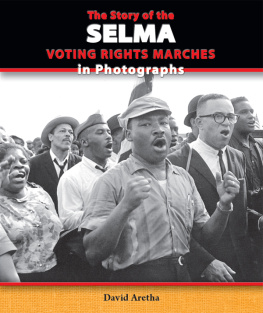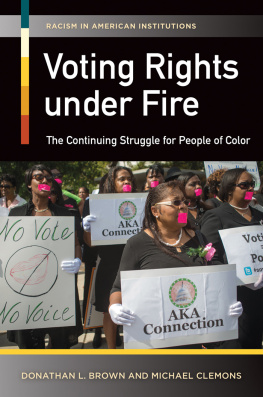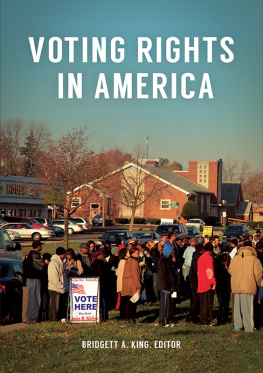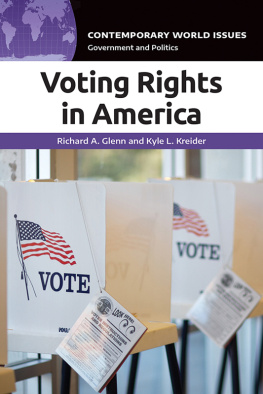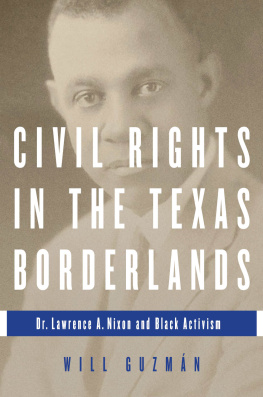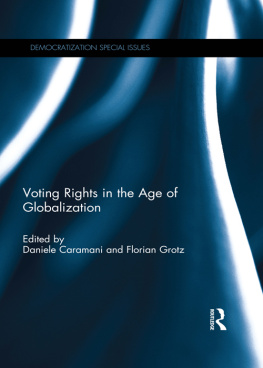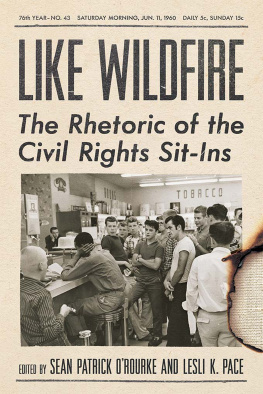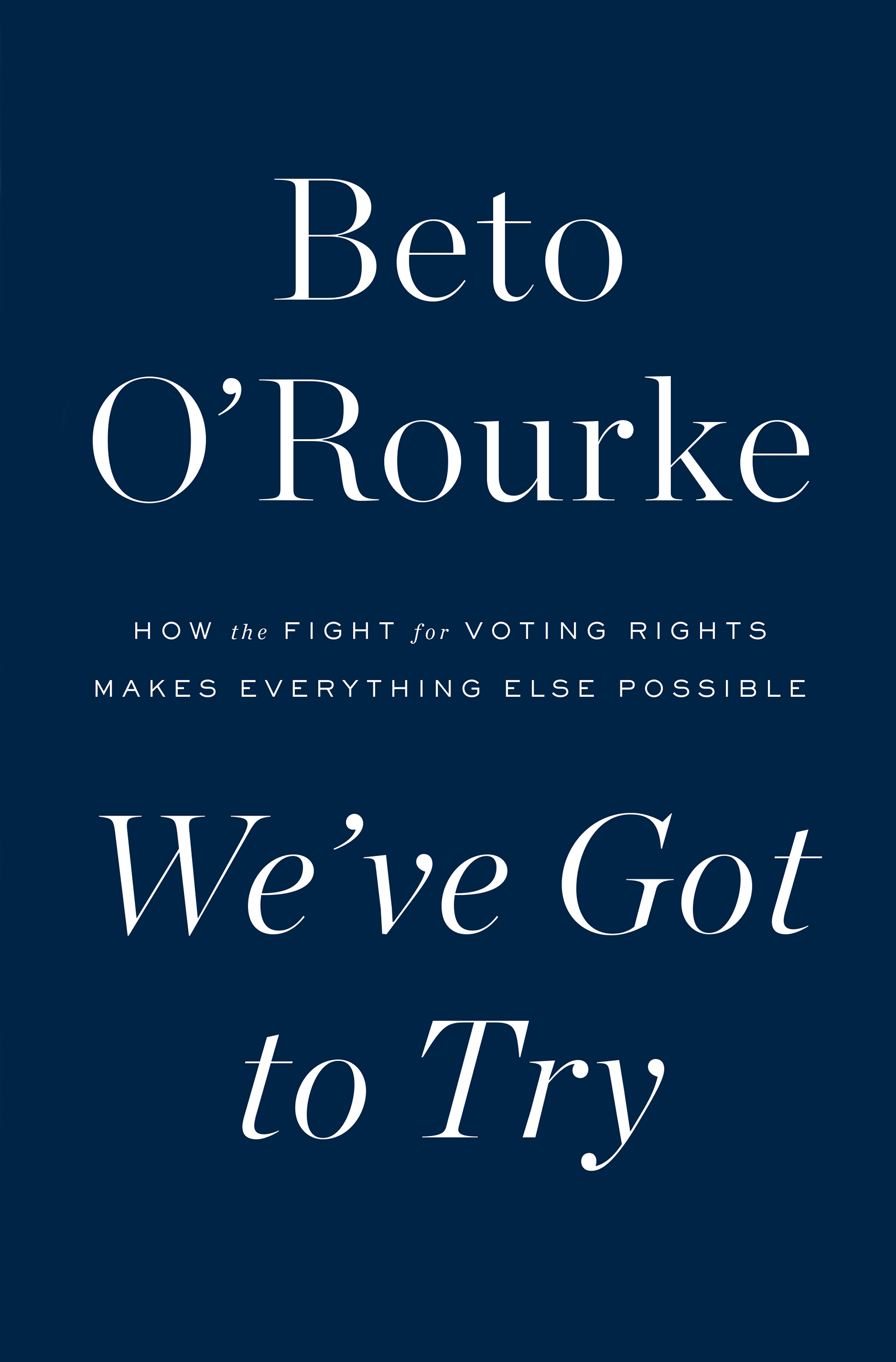Contents
Guide
Pagebreaks of the print version

The author and publisher have provided this e-book to you for your personal use only. You may not make this e-book publicly available in any way. Copyright infringement is against the law. If you believe the copy of this e-book you are reading infringes on the authors copyright, please notify the publisher at: us.macmillanusa.com/piracy.
For Lawrence Nixon and all who fight for the right to vote, whatever the odds
It was November 1886, just after midnight, and the poll workers in Washington County knew something was wrong as soon as Dewees Bolton walked into the Flewellyn precinct.
Voting had concluded and now counting by official election workers was well underway. So it was an odd time for a stranger to burst through the door, especially one whose face was covered by a handkerchief.
Bolton was also wearing a slickera yellow oilproof coatthat further disguised his appearance.
And he had a gun.
This wasnt the first time a Black polling location in Washington County had been attacked. Two years earlier, three Black elections officials had been murdered at a polling location ten miles away. And earlier this night, ballot boxes in the area had been stolen.
To the poll workers in Flewellyn, it would have been clear that a violent, organized plot to rig the election was underway.
So when the armed intruder made for the ballot box in a blatant attempt to destroy the votes before the count could be finished in this heavily Black precinct, the poll workers decided to fight backto defend democracy.
In the struggle, one of them shot and killed Bolton.
It was later revealed that the intruder was in fact a member of a gang of ballot thieves organized by the Peoples Party of Washington County, an offshoot of a movement that had recently burst onto the scene in the former Confederacy hoping to redeem communities from Black political participation. Their goal, in other words, was to keep the political system entirely white, even after slavery had been abolished. And violence was the primary tool they used to accomplish that objective.
Yet despite the clear evidence that it was the Peoples Party that brought danger to Washington County that night, the only people arrested in connection with the events were those who stopped Bolton from stealing the ballot boxes.
Within a week of the election, the sheriff apprehended eight African American men for Boltons death. But within a month, and before a court could rule on whether or not they were guilty, an unidentified group of men broke into the jail where they were being held, abducted three of the prisoners, and took them to Sandy Creek, about a mile outside of town.
There, the three prisonersShad Felder, Alfred Jones, and Stewart Joneswere hanged. While some attempted to claim that the lynchings were directed by unknown members of the Klan, it soon became clear that the plot to steal the electionand perhaps the plan to kill the poll workerswas led by the man at the top of the countywide ticket, incumbent county judge Lafayette Kirk.
After visiting the Flewellyn polling location on Election Night, Kirk telegraphed Bolton with the message: Things here look gloomy; do your work. It was only after receiving those instructions that Bolton arrived with his handkerchief, slicker, and gun to steal the votes.
Nevertheless, the popular press blamed the hangings not on Kirk or the terrorists of the Peoples Party but on the party that had been attacked in the first place. The Galveston News claimed the lynchings were the effect of incendiary speeches made by Republican candidates. While all good citizens regret the hanging, the paper wrote, they cannot but think that tardy justice was done.
The newspaper in Brenham, the county seat, agreed and argued that the lynchings were conducted with the utmost gentility.
The hanging of these negroes by a mob is an occurrence to be regretted, but it was brought on by the very men who professed to have the greatest friendship for the negro. The negroes were scientifically hanged with new grass ropes. The bodies were cut down and hauled to town. New drawers, undershirts, and nice shrouds were purchased and good coffins procured after which they were turned over to their friends and relatives, who took them to their former homes near Flewellen for burial.
Though Kirk would be brought to trial by the United States attorney in Austin, the case against the leader of the Washington County election thieves never stood much of a chance.
To start with, Kirks defense was provided pro bono by former Texas governor John Ireland. Also accompanying Kirk during the trial was sitting U.S. senator Richard Coke. There would be no mistaking where the real power in Texas stood, regardless of the facts of the case.
The attorney for the three lynched poll workers laid out the details of the ballot-theft plot and made the case that their murders were an effort to silence the witnesses to the original crime. He insisted that they were killed because they were the only ones who could provide the necessary incriminating testimony about Judge Kirks role in the plot. But whatever the evidence, the jury took the side of Kirk and the powerful men who stood with him.
After just three days of testimony and deliberations, they found Kirk innocent.
The failure to hold the ringleaders accountable not only made a mockery of the rule of law but also sent a chilling message to those who might still believe in free and fair elections: Not here. Not now. Not yet.
I first heard this story as I was working on voting rights in Texas in January 2021 with a group of new volunteers. We had started Powered by People the year before to register voters across the state and fight for the full franchise for all eligible citizens. More than twenty thousand volunteers eventually signed up, registering hundreds of thousands of voters and convening conversations on voting rights across the state, from some of the smallest rural counties to the biggest cities in Texas. These new recruits were stepping up to join the effort.
I did my best to make the case that the work I was asking them to do was urgent. I told them that since 2013, more than 750 polling locations had been closed across Texasfar more than in any other state, and most of them were concentrated in the fastest-growing Black and Latino neighborhoods.
I shared that a panel of three federal judges, two of whom were appointed by Republican presidents, described our congressional districts as a racial gerrymander for drawing voters of color out of competitive districts to diminish the power of their vote.
And I cataloged other extreme measures taken in Texas since the Voting Rights Act was stripped of much of its power to protect the right to vote by the Supreme Courts 2013 Shelby v. Holder decision, keeping millions from participating in our democracy.
I then asked them, How can we get Texans, especially young Texans, to understand the stakes when it comes to voting rights?
Tayhlor Coleman, a young volunteer whom I was meeting for the first time, was the first to respond.
Something that really helped me view the stakes more plainly was getting grounded in the proud history of Black Texans place in the fight for the right to vote, beginning right after emancipation.
By learning that history, she continued, I was able to recognize the direct through line to the fights we are still having over voting rights, suppression, and disenfranchisement today.


